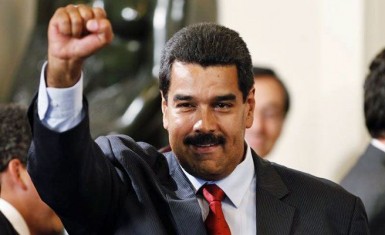CARACAS, (Reuters) – Venezuela’s election board gave opposition leaders yesterday a document letting them begin the process of seeking a referendum to remove President Nicolas Maduro, who is under fire over a deepening economic crisis.
Triple-digit inflation, Soviet-style production shortages and a severe recession have made the socialist leader broadly unpopular, and the opposition’s decisive victory in legislative elections last year has emboldened it to push for a recall vote.
Opposition legislators chained themselves to the council’s office last week to protest its failure to provide the paperwork for the first step toward collecting the nearly 4 million signatures needed to trigger the referendum.
They celebrated yesterday’s move as a political victory and changed plans for a protest march today to a signature drive instead.

“Today we took a first step to begin the recall of Maduro,” opposition deputy Elias Matta tweeted. “We the people support change, there is no way to stop it.”
But supporters of the recall effort face a protracted and uncertain road.
The opposition must now officially ask the elections council to oversee the collection of some 200,000 signatures, and then must request another petition drive in which it must gather the required 4 million signatures.
Venezuela’s opposition-dominated National Assembly has passed legislation to streamline the process for seeking recall votes, but the Supreme Court, which routinely backs Maduro in disputes with the legislature, looks certain to strike it down.
On Tuesday, the court ruled that any constitutional amendment to reduce the presidential term could not be made retroactive, shooting down one of the opposition’s other main strategies to oust Maduro, who was elected in 2013.
Maduro, 53, the hand-picked successor of the late socialist president, Hugo Chavez, has sworn he will not be forced out before his term ends in 2019 and has accused the opposition of seeking to stage a coup against him.
“No one can bring down this revolution,” said Socialist Party stalwart and lawmaker Pedro Carreno in reaction to Tuesday’s news, saying the opposition could not defeat the ruling “Chavismo” movement either in the street or at the polls.
Should the opposition succeed in recalling Maduro this year, a new election would be held. But a recall in 2017 would leave the presidency in the hands of the vice president, a post currently held by Socialist Party loyalist Aristobulo Isturiz.





